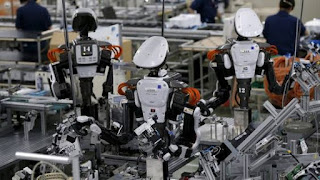According to some supply-chain bottleneck joke doing the rounds inside the factory automation industry, It‘s now quicker to gestate a baby than secure a reduction gear from Harmonic Drive Systems. Hilarious, certainly, but can it be investable?
The obvious answer, for all those specifically taking a look at Japan’s world-class industrial robotmakers (and critical part suppliers for example Harmonic ) inside the context of the worldwide automation theme and strong interest in reduction gears, would appear to become Yes.
Brokers are particularly keen onto it at this time, because prices of Japanese robotmakers have dipped sharply since their stellar run-up last year, so that they look cheaper than they did in January as the buy case remains arguable whilst the remainder of the Japanese market runs into concerns about trade wars and also a stronger yen. With an international comparison the typical price to book ratio of Japanese automation stocks is 25 per cent below the typical of foreign peers.
For some, the robot narrative envisages a relatively clean play about what one analyst covering Japanese stocks describes as “the coming industrial revolution centred on China”, and Beijing’s expected resolve for policies aimed at making its production base more competitive through automation.
China, runs the bull case, may eventually aim for the automation rate on the par with where Japan’s is now, and, whilst its own robotmakers raise their game, Japanese companies will thrive as key component producers.
Others build it into your broader narrative of Japan’s domestic potential for replacing humans with machines.
A technique report from Mizuho Securities published on Monday picked up on the recent international comparison of labour productivity, during which Japan scored dismally, to conisder that investors should therefore concentrate on sectors, for example robots, that could take pleasure in any pro-productivity government policies that emerge.
The matter, as analysts at CLSA point out, is, together with their price-to-book ratios, Japanese automation companies show a return on equity that is likewise about 25 per cent less than the typical for international peers (because of the cash-heavy balance sheets ).
Additionally, it might be a stretch to expect the likes of Yaskawa Electric, Fanuc and Keyence to rebound strongly came from this level. Hard-to-source reduction gears notwithstanding, the robots could have to interrupt more of the sweat than they‘re now to be up and coming given by a Japanese machinery sector whose market cap weighted price to book multiple is with a point where It‘s historically begun to trade sideways.
The obvious answer, for all those specifically taking a look at Japan’s world-class industrial robotmakers (and critical part suppliers for example Harmonic ) inside the context of the worldwide automation theme and strong interest in reduction gears, would appear to become Yes.
Brokers are particularly keen onto it at this time, because prices of Japanese robotmakers have dipped sharply since their stellar run-up last year, so that they look cheaper than they did in January as the buy case remains arguable whilst the remainder of the Japanese market runs into concerns about trade wars and also a stronger yen. With an international comparison the typical price to book ratio of Japanese automation stocks is 25 per cent below the typical of foreign peers.
For some, the robot narrative envisages a relatively clean play about what one analyst covering Japanese stocks describes as “the coming industrial revolution centred on China”, and Beijing’s expected resolve for policies aimed at making its production base more competitive through automation.
China, runs the bull case, may eventually aim for the automation rate on the par with where Japan’s is now, and, whilst its own robotmakers raise their game, Japanese companies will thrive as key component producers.
Others build it into your broader narrative of Japan’s domestic potential for replacing humans with machines.
A technique report from Mizuho Securities published on Monday picked up on the recent international comparison of labour productivity, during which Japan scored dismally, to conisder that investors should therefore concentrate on sectors, for example robots, that could take pleasure in any pro-productivity government policies that emerge.
The matter, as analysts at CLSA point out, is, together with their price-to-book ratios, Japanese automation companies show a return on equity that is likewise about 25 per cent less than the typical for international peers (because of the cash-heavy balance sheets ).
Additionally, it might be a stretch to expect the likes of Yaskawa Electric, Fanuc and Keyence to rebound strongly came from this level. Hard-to-source reduction gears notwithstanding, the robots could have to interrupt more of the sweat than they‘re now to be up and coming given by a Japanese machinery sector whose market cap weighted price to book multiple is with a point where It‘s historically begun to trade sideways.








No comments:
Post a Comment